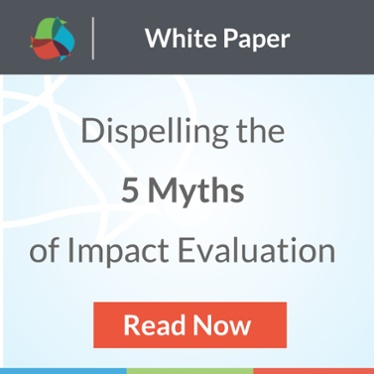 It’s no secret that grantmakers continue to struggle with how to approach evaluation and create a path towards more meaningful and informative impact measurement. With good reason! This is tough work.
It’s no secret that grantmakers continue to struggle with how to approach evaluation and create a path towards more meaningful and informative impact measurement. With good reason! This is tough work.
Don’t get me wrong. There is excellent evaluation work being done in philanthropy, but for most foundations challenges to meaningful evaluation remain persistent – but not insurmountable.
That’s why I’m excited to be hitting the road to Hollywood to join in the conversation at this year's Peak Grantmaking conference, their first event under the organization’s new moniker. There I’ll be joined by Ericka Novotny, grants management director at Arcus Foundation and Susan Rosenbloom, director of finance and administration at the Farash Foundation, to discuss their experiences on the ground working towards measuring impact.
If you are joining us in Hollywood next week, please stop by and say hello. I would love to meet you and hear about some of your organization’s issues and challenges around measuring impact, as well as your successes!
I’d also like to hear your thoughts on some of the biggest issues and challenges that I see in the philanthropic sector. Here are a couple that I see quite often:
Capacity – The lack of foundation capacity is the biggest hindrance to meaningful evaluation in philanthropy. And when I say “capacity” I mean more than just having a dedicated researcher or evaluator on staff. Capacity is also about having the time and resources to find, understand, and use data and metrics appropriately for your specific programs and in the contexts in which they are implemented. It’s having the ability to reconcile all the varied and – in some cases – contradictory information and guidance that exists. And it’s about possessing the systems and technology to collect, analyze, visualize, and share data in an effective and efficient way.
Preparation for Impact – While there is a lot of very good evaluation work being done, there is also a lot of confusion, misinformation, and conflicting opinions swirling around. The problem is that too many foundations are jumping right to conducting an impact evaluation and not doing critical developmental and implementation evaluations to prepare for assessing impact.
Developmental evaluation allows us to develop a framework that tells us what outcomes to target and what data to use, what analyses to examine, and what methods are appropriate. And implementation evaluation can reveal if our model is accurate, or if there are other factors associated with the implementation or context that we did not consider previously. The process for both of these formative evaluations allows us to be confident that the story that we have developed for how change will occur is accurate and any results we obtain from an impact evaluation can be attributed to the program and not some other factor.
Technology – I have always said that the true goal of philanthropy is to turn one success story into 1,000 similar success stories.”But in order to accomplish this we need to be able to ensure that our data and metrics are appropriate and meaningful. We also need to be able to collect, merge, and analyze our data and share it within our organization and ultimately across the sector.
Thankfully, technology can help address these challenges and help build capacity of foundation staff in the process. New technology makes it easier than ever to achieve these goals and find other funders, nonprofits, and organizations that are doing similar work or working in similar contexts.
Technology also allows your organization to leverage existing knowledge, expertise, and data. And the right technology can make the data much more accessible, giving you the critical ability to compare data and metrics across contexts and in different settings, in order to identify those factors that might be driving impact or deterring it. This will allow your organization to replicate the work and ultimately expand your impact and achieve more success and overall sustainability.
These are just a few of the issues and challenges to measuring impact that we will be discussing during our session on Monday with Arcus and Farash Foundation. Please join us! And make sure that you stop by Fluxx’s exhibition booth to say hello.
